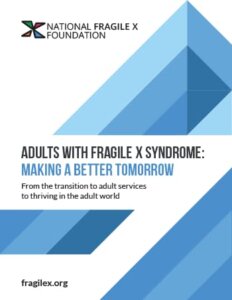Discovering Your Young Adultʼs Strengths for a More Satisfying Career Path | NFXF (original) (raw)
-
- Fragile X 101
* Fragile X 101
* Prevalence
* Signs and Symptoms
* Genetics and Inheritance
* Testing and Diagnosis - Fragile X Syndrome
* Fragile X Syndrome
* Newly Diagnosed
* Fragile X & Autism - Associated Conditions
* Premutation
* FXPOI
* FXTAS
* New Developments - Xtraordinary Individuals
- 31 Shareable Fragile X Facts
- Fragile X Info SeriesFact sheets by topic
- Fragile X MasterClass™️
- Knowledge CenterFrequently asked questions.
- Fragile X 101
-
- Resources for Families
- FXS Strategies by Topic
* Adulthood
* Autism
* Behavior
* COVID-19
* Daily Living
* Females
* Medications
* Physical & Medical Concerns
* Puberty & Sexuality
* School & Education - FXS Resources by Age
- Premutation Topics
* The Fragile X Premutation
* FXTAS Resources
* FXPOI Resources
* Reproductive Resources - Newly Diagnosed
- ResearchLearn and participate
* Research 101What is research?
* STX209 Reconsent ProjectEnrollment is open
* International Fragile X Premutation Registry — For ParticipantsEnroll now
* Participate in ResearchMyFXResearch Portal
* Original Research Articles
* FORWARD-MARCHDatabase and registry
* Research ResultsNew and archives - Find a Fragile X Clinic
* U.S. Fragile X Syndrome Clinics
* FXTAS-Specific Clinics
* International Clinics & Organizations - Find a Contact Near You
- Knowledge CenterOur Fragile X library
- Webinars & Videos
- Printable Resources
- Treatment Recommendations
-
- Resources for Professionals
- NFXF MasterClass™️ for Professionals
- Research Readiness ProgramResearch facilitation for researchers
- NFXF Data Repository
- International Fragile X Premutation Registry — Research Requests
- FORWARD-MARCHRegistry & Database
- NFXF-Led PFDD Meeting for Fragile X SyndromePatient-focused drug development
- Marketing Your Research Opportunities
- Treatment Recommendations
- Fragile X Clinics
* U.S. FXS Clinics
* FXTAS-Specific Clinics
* International Clinics & Organizations - NFXF RESEARCH AWARDS
* Randi J. Hagerman Summer Scholar Research Awards
* Junior Investigator Awards
Get
Involved-
- Fragile X 101
* Fragile X 101
* Prevalence
* Signs & Symptoms
* Genetics and Inheritance
* Testing and Diagnosis - Fragile X Syndrome
* Fragile X Syndrome
* Fragile X & Autism - Associated Conditions
* Premutation
* FXPOI
* FXTAS
* New Developments - Xtraordinary Individuals
- 31 Shareable Fragile X Facts
- Fragile X Info Series
- FRAGILE X MASTERCLASS
- Knowledge Center
- Fragile X 101
-
- Resources for Families
- FXS Strategies by Topic
* Adulthood
* Autism
* Behavior
* Daily Living
* Females
* Medications
* Physical & Medical Concerns
* Fragile X and Puberty & Sexuality
* School & Education - FXS Resources by Age
- Premutation Topics
* The Fragile X Premutation
* FXTAS Resources
* FXPOI Resources
* Reproductive Resources - Newly Diagnosed
- Research
* Research 101: What is Research?
* STX209 Reconsent Project
* International Fragile X Premutation Registry — For Participants
* Participate in Research
* Original Research Articles
* FORWARD-MARCH
* Research Results Roundup - Find a Clinic Near You
- Find a Contact Near Your
- Knowledge Center
- Webinars & Videos
- Printable Resources
- Treatment Recommendations
-
- Resources for Professionals
- NFXF MasterClass™️ for Professionals
- Research Readiness Program
- NFXF Data Repository
- International Fragile X Premutation Registry — Research Requests
- FORWARD-MARCH Registry & Database
- NFXF-Led Patient-Focused Drug Development Meeting
- Marketing Your Research Opportunities
- Treatment Recommendations
- Find a Clinic Near You
- NFXF Research Awards
* Randi J. Hagerman Summer Scholars
* Junior Investigator Awards
Discovering Your Young Adultʼs Strengths for a More Satisfying Career Path
Estimated Reading Time: 10 min.
Finding a job can be hard, especially if you’re unsure of how and where to start. For young adults with Fragile X syndrome you also need to be mindful of different work environments and how they may affect your child’s ability to succeed.
We have some tips from Fragile X parents and caretakers on how they figured out which job and environment best suited their young adult. This also applies to volunteer positions.
Past Jobs and Experiences
Look at your young adult’s past jobs. If they’ve never had a traditional job, think about a time, place, or event that most closely mimics a job and having responsibilities. This could be a school project, or being part of a sports team.
Next, think about what they specifically liked or disliked about each. Common responses are too many difficult tasks, not enough social interaction, too difficult to get to, and being given responsibilities that aren’t much fun.
Understanding what your young adult values in a job and workplace environment can help frame your search for a more permanent job. Also look for trends or commonalities of past jobs to see if you can identify their tendency toward certain types of work.
Personal Interests and Passions
Just as it’s a good idea to look at your young adult’s past work experience, also take the time to understand what they like to do outside of a workplace setting. While having a job automatically comes with a set responsibilities, jobs that revolve around their interests can be more rewarding and engaging.
When parents asked their young adults about what they liked to do outside of work, the most common responses were sports, music, and leisure activities. For example, one young man who loves sports became the manager of their high school football team. Another good example is Zachary, who loves animals (cheetahs in particular) and became a volunteer at his local zoo.
Identifying Strengths
When parents asked their young adults to name their strengths, responses included levels of independence, character traits, and communication skills. Being self-aware about one’s strengths and weaknesses is already a step in the right direction, as is being able to communicate and relay these strengths to others.
From there, prompt them on the strengths you know they have but they may not recognize. For example, things that come easily to us or we take for granted, we don’t realize their value, or that it’s not easy for others. Then there are the things that don’t come easily or are hard to complete, these are things we often have trouble taking credit for.
What Do You Want to Do?
Ask your young adult what type of job they want, how often they would like to work, and what type of environment. Finding the perfect job may take time and many attempts, but you’ll have a better chance of long-term success if you give first consideration to finding the ideal environment, looking closely at your young adult’s talents and learning style, and giving them your full support.
We’re all different, and while it may be daunting to find the “perfect” job for your child, careful thought and research ensures that the job your child lands in will be one they will enjoy and thrive in.
We have more information on what you’ve read here — plus finding a job, building on strengths and interests, traveling to and from work, tolerance levels and sensory issues, learning new skills, and short- and long-term support — in our ebook Adults With Fragile X Syndrome: Making a Better Tomorrow.
author

Jasmine Shen Jasmine worked as an intern for the National Fragile X Foundation during the summer of 2021. A student at Johns Hopkins, she is majoring in economics and public health. She loves hiking, baking, and spending time with family.
Adults with Fragile X Syndrome:
Making a Better Tomorrow
We have built the ultimate guide on transitioning into and continuing to care for adults with Fragile X syndrome. Our ebook includes chapters on:
Transition to Adult Services ♦ Transportation ♦ Housing ♦ Employment, Volunteering & Day Programs ♦ College & Post-Secondary Education ♦ Daily Living
